
Yunus Environment Hub will play an active role at COP29 in Baku by hosting and participating in high-level side events on climate action. We will discuss the role of social business in driving a just transition, sustainable and inclusive finance and climate resilience. We invite you to join us in these critical conversations:
Note: when possible events will be live streamed for those unable to attend in person.
Side Event 1: Social Business as a driver for a just circular economy transition
- Date: 14 November
- Time: 10:30-11:30
- Location: Waste and Resources Pavilion (Green Zone)
- Organizers: Yunus Environment Hub and ISWA
Session overview:
Social business models, with their inherent focus on addressing social and environmental challenges, can be a driver for a just transition in circular economy. This session will bring social business entrepreneurs to share best practices in scaling inclusive, circular models in waste management. We will also hear from government leaders and waste management organizations who will share examples of initiatives supporting social businesses. The group will discuss challenges and opportunities from diverse perspectives, including recommendations to elevate the just transition topic at the upcoming INC-5.
The session will begin with insights from the 2024 research report on “Towards a Sustainable Future: Recommendations for a Just Transition in Waste Management and Circular Economy in the ASEAN Region” conducted by Yunus Environment Hub on behalf of Deutsche Gesellschaft für Internationale Zusammenarbeit (GIZ) GmbH. The report will set the scene for an interactive panel discussion on building inclusive, circular models that reduce waste while ensuring no one is left behind.
Panelists:
- Christina Jäger, co-founder & Managing Director, Yunus Environment Hub (moderator)
- Lara van Druyten, Member of the Advisory Board of Eminent Persons on Zero Waste by the Secretary-General of the United Nations, Founder and CEO The Waste Transformers
- Alex Wang, Managing Director, Global Committee on Social Business for Sustainable Development Goals
- Mr. James Law, President, International Solid Waste Association (ISWA)
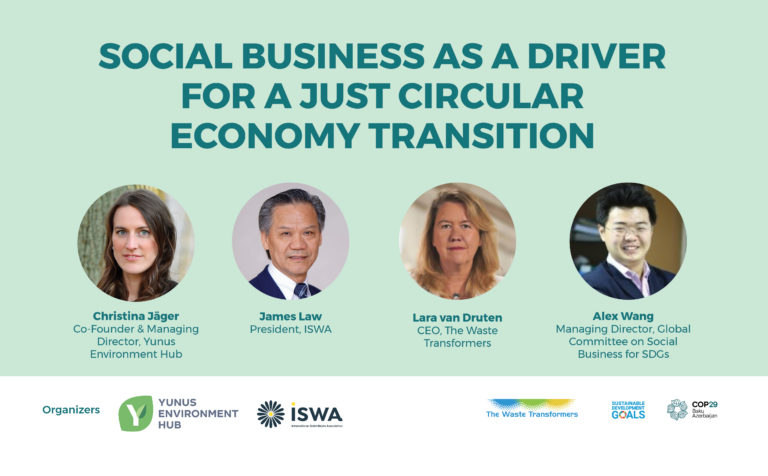
Side Event 2: Sustainable Financing for Improved Solid Waste Management Systems
- Date: 15 November
- Time: 10:00-11:00
- Location: Multilevel Action and Urbanization Pavilion (Blue Zone)
- Organizers: ACCP Secretariat (UN-Habitat), UN SG’s Advisory Board on Zero Waste
Session overview:
Properly functioning waste management systems are essential for maintaining public health, reducing pollution, and preventing climate-related damage. However, one of the most persis-tent challenges in waste management, especially in lower-income regions, is securing ade-quate and reliable financing. Without sustainable financial models, cities struggle to maintain and improve infrastructure, retain skilled personnel, and expand waste services to under-served communities.
This session will serve as a dynamic forum for discussing best practices and collaborative strategies that will help transform financing models and equip cities with the resources they need to manage waste sustainably. By addressing these financial challenges head-on, we can pave the way for cleaner, healthier, and more resilient urban environments worldwide.
Panelists:
- Ms. Shiho Jinno, Waste Management Specialist, UN-Habitat (Moderator)
- Christina Jäger, Co-Founder & Managing Director, Yunus Environment Hub
- H.E. Fatima Maada Bio, First Lady of Sierra Leone
- Lara van Druten, Member of the Advisory Board of Eminent Persons on Zero Waste by the Secretary-General of the United Nations, Founder and CEO The Waste Transformers
- Dr. Akinyemi Akinyugha, Technical Adviser to the Governor (Green Economy and Ecological Matters), Ado Elitiy, Nigeria (ACCP Member City)
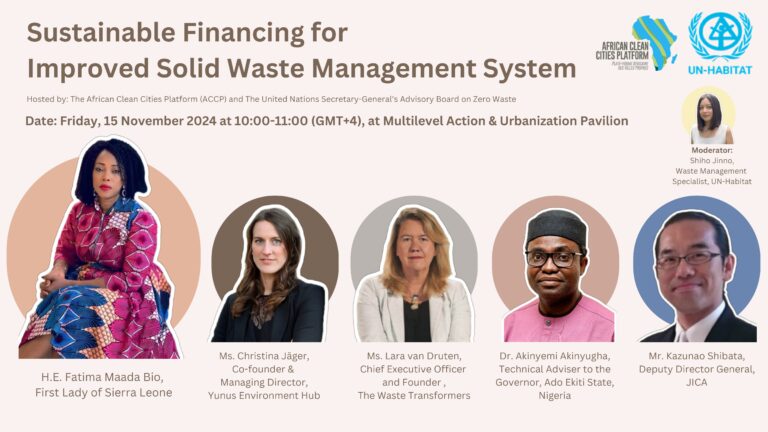
Side Event 3: Just Transition – Perspectives from the Mediterranean Region and Global South
- Date: 15 November
- Time: 18:30 – 22:00
- Location: Side Event Room 6 (Blue Zone).
- Organizer: UNFCCC
Session overview:
The concept of a Just Transition has attained considerable significance in the discourse on sustainable development and climate action. It endeavours to ensure that the transition towards a green economy is executed in a manner that is equitable and inclusive, considering the socioeconomic implications for affected communities. The Mediterranean Region and the Global South, with their distinct challenges and opportunities, provide valuable insights and diverse perspectives on implementing a Just and Fair Transition. This proposed session, as part of the UNFCCC organised side event at COP29 in Baku, Azerbaijan, aims to contribute to the discourse by examining the various perspectives, approaches, and modalities to ensure a fair and just transition relevant for regions in the Mediterranean and global south more broadly.
The primary objective of this side event is to establish a forum for the discussion of Just and Fair Transition, incorporating perspectives from the Mediterranean Region and the Global South, as well as examining the potential roles of regional institutions and multilateral development banks, and the opportunities presented by modalities such as Islamic Finance in facilitating this equitable transition. The event aims to promote dialogue among diverse stakeholders, including government representatives, finance ministries, multilateral development banks, private sector entities, think tanks, and organised labour.
High-Level Panel Discussion:
- Ambassador Grammenos Mastrojeni, Senior Deputy Secretary General, Union for the Mediterranean (Moderator)
- H. E. Yasmine Fouad Minister of Environment, The Arab Republic of Egypt
- H.E. Dr. Leila Benali, Minister of Energy Transition and Sustainable Development for the Kingdom of Morocco
- Dr. Kevin Kariuki, Vice President for Power, Energy, Climate and Green Growth, African Development Bank
- Satya Tripathi, former UN Assistant Secretary-General, President, Global Alliance for a Sustainable Planet
Technical Panel Discussion:
- Omar Shaikh, Managing Director, Global Ethical Finance Initiative (Moderator)
- Christina Jäger, Co-founder & Managing Director, Yunus Environment Hub
- Mr. Martin Heibel – Communication Manager – Interreg NEXT MED Programme
- Vijay Bains, Chief Sustainability Officer, Emirates NBD
- Dr Moustapha Kamal Gueyes, Director, Priority Action programme Just Transition, International Labour Organisation
- Dr. Daouda Ndiaye, Manager, Climate Change and Environment, IsDB
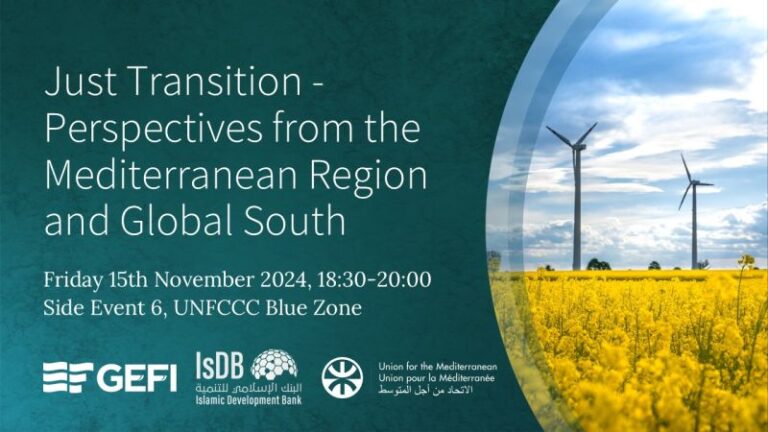
Side Event 4: Ensuring a just transition in circular economy and waste management
- Date: 16 November
- Time: 10:00 – 11:00
- Location: Just Transition pavilion (Blue Zone)
- Organizer: Yunus Environment Hub
Session overview:
We urgently need to shift from our current take-make-waste mentality to a circular economy. However, the circular transition often focuses only on environmental impact, leaving out critical social elements. This interactive panel will focus on building inclusive, circular models that reduce waste, while ensuring a just transition for all. Panelists from waste management organizations, government and social business will share challenges, experiences and recommendations on the topic.
Panelists:
- Christina Jäger, Co-Founder & Managing Director, Yunus Environment Hub (Moderator)
- Dr. Farhina Ahmed, Secretary, Ministry of Environment, Forest and Climate Change (MoEFCC) of Bangladesh
- Frank Siebern-Thomas, Head of Unit for Fair Green and Digital Transitions, Research European Union
- Lara van Druten, Member of the Advisory Board of Eminent Persons on Zero Waste by the Secretary-General of the United Nations, Founder and CEO The Waste Transformers
- John Leo Algo, National Coordinator, Aksyon Klima Pilipinas & Member of Youth Advisory Group (YAG) for Environmental and Climate Justice
Link to live stream: ILO Live – Ensuring a just transition in circular economy and waste management
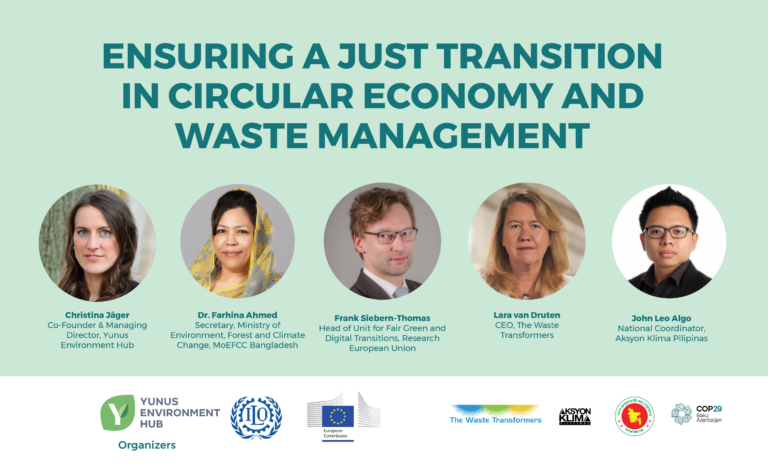
Side Event 5: Social Pressures and Climate Change: Do Climate Targets Reflect a Just Transition?
- Date: 16 November
- Time: 14:30 – 15:30
- Location: Mediterrean pavilion (Blue Zone)
- Organizers: MedWaves and Hot or Cool Institute
Session overview:
After two COPs, a holistic and operational approach to just transition remains incomplete. It’s increasingly evident that the climate crisis cannot be addressed without equitable resource distribution and clear identification of primary hotspots requiring urgent attention. Sustainable consumption and production must be recognized as two sides of the same coin, allowing policymakers and economic actors to rethink systemic economic actions.
This side-event will highlight how shifting towards circular, frugal, low-carbon and fair equitable socioeconomics pathways aligned with climate targets can have transformative impacts, including rapid mitigation, if effectively incorporated into current climate actions, socio-economic policies and proper funding mechanisms
Panelists:
- Mr. Matías Ibáñez Sales of MedWaves (Moderator)
- Christina Jäger, Co-Founder & Managing Director, Yunus Environment Hub
- Dr. Lewis Akenji, Executive Director, Hot or Cool Institute
- Mr. Jesus Maestro, Director, MedWaves
- Dr. Takeshi Kuramochi NewClimate Institute
Link to live stream: Social Pressures and Climate Change: Do Climate Targets Reflect a Just Transition?
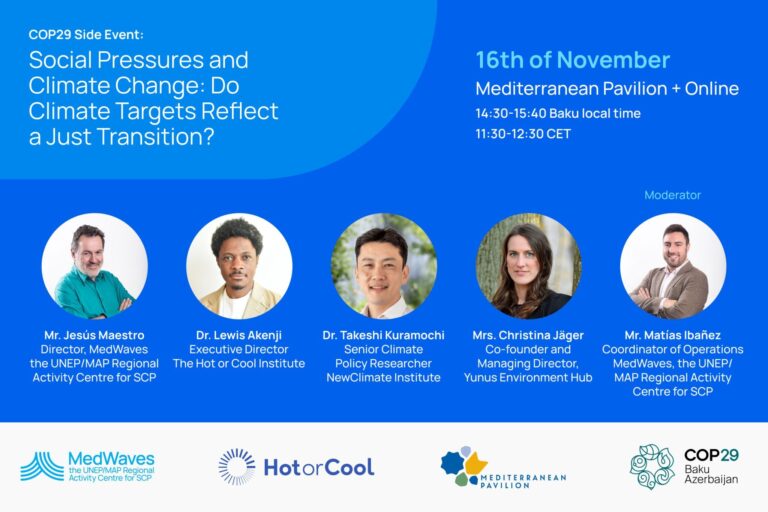
Statement by
H.E. Professor Muhammad Yunus
Hon’ble Chief Adviser
Government of the People’s Republic of Bangladesh
at the World Leaders Climate Action Summit at COP 29 13 November 20241 Baku, Azerbaijan
Mr. President,
I seek your permission to present the climate catastrophe in a different perspective. This perspective will take us from fixing climate destruction to stopping further carnage. lt is a big task and raises big questions. 1 seek your indulgence to share with you my longstanding dream of creating a new world of three zeroes.
The climate crisis is intensifying.
Our civilisation is at grave risk as we continue to promote selfdestructive values. We need to mobilise our intellectual, financial and youth power to lay the foundation for a new civilisation — a selfpreserving and self-reinforcing civilisation.
We, the human inhabitants of this planet, are the cause of the destruction of the planet. We are doing it deliberately.
We have chosen a lifestyle which works against the environment. We justify this with an economic framework which is considered as natural as the planetary system.
That economic framework thrives on limitless consumption. The more you consume, the more you grow. The more you grow, the more money you make. Maximisation of profit is treated as the force of gravity which lets everything in the system to play its role according to our desire.
In order to survive we need to create another culture.
A counter-culture which is based on a different life-style. lt is based on zero waste. lt will limit consumption to essential needs, leaving no residual waste This life-style will also be based on zero carbon. No fossil fuel. Only renewables.
This will be an economy based primarily on zero personal profit, i.e. on social business. This business is defined as a non-dividend business addressed to solve social and environmental problems. A vast part of social businesses will focus on protecting the environment and mankind. Human lives will not only be protected but qualitatively enhanced through affordable healthcare and education. lt will facilitate entrepreneurship for the youth. Young people will get prepared through new education of entrepreneurship. Education of creating job seekers will be replaced by entrepreneurship-focused education.
Safety of environment needs a new life-style. That life-style would not be imposed, it will be a choice.
Young people love that life style as a choice. Each young person will grow up as a three zero person – zero net carbon emissions, zero wealth concentration, through building social businesses only, and zero unemployment by turning themselves into entrepreneurs. Each person will grow up as a three zero person, and remain a three zero person all his/her life. That will create the new civilisation.
It can be done.
All we need do is to accept a new life-style consistent with the safety of the planet and all who live on it.
Today’s generation of youth will do the rest. They love their planet.
I hope you’II join me in this dream. lf we dream together, it will happen.
Thank you.
Reach out to our team to learn more info@yunuseh.com
Photo credit: Unsplash, UN-Habitat, UNFCCC, MedWaves